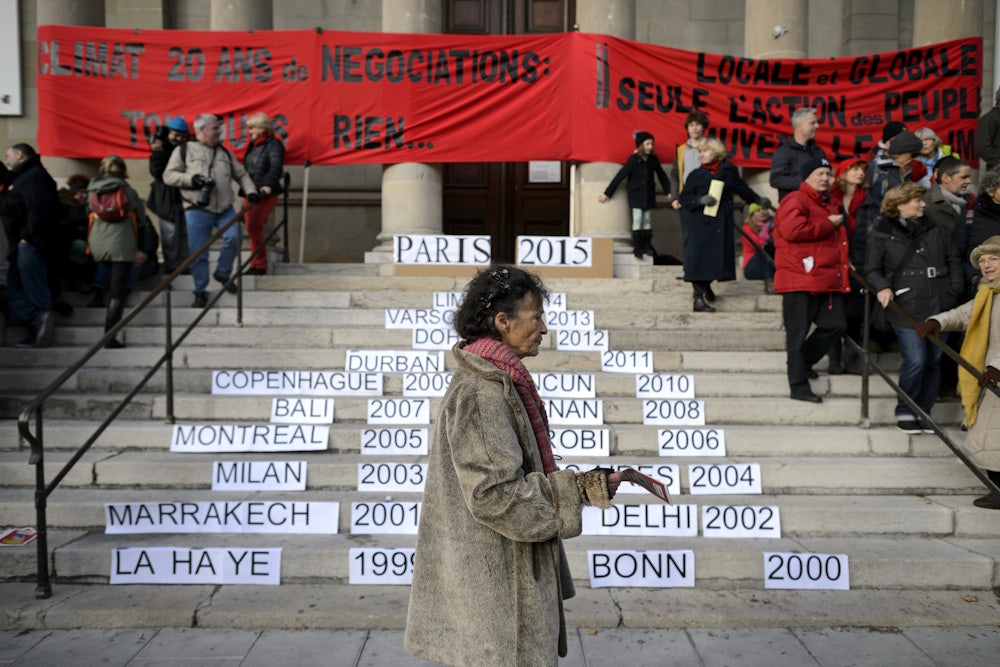Paris, city of romance, doesn’t seem so romantic these days. The terrorist attacks that struck the city in mid-November were a horrific reminder—as if one were necessary—of a creeping, inchoate threat whose strikes can’t be easily predicted, let alone stopped.
The global campaign against climate change that today will descend on Paris has, similarly, lost an air of innocence it once had. And that bodes well for the planet. The last time political and business leaders gathered en masse to try to stanch global warming, in 2009 at a United Nations-sponsored climate conference in Copenhagen, they sought and failed to ink a climate coup de grace: a unified global carbon-cutting pact. They failed because of fighting among countries over who would foot the bill—fighting that reflected, at its root, a lack of broadly perceived urgency about carbon dioxide, a colorless, odorless gas. They failed, in other words, because climate change, like terrorism, is a chronic and elusive threat.
In the six years since Copenhagen, climate change has only grown harder to defeat. Some cleaner energy technologies, such as wind and solar, have gotten cheaper. But global emissions have continued to rise, and scientists say that, given the increased concentration of carbon dioxide in the atmosphere, it’s now essentially impossible to avoid dangerous climate impacts. What nevertheless offers hope for the Paris conference is that the diplomats and CEOs turning up there have gotten wiser about the peril. They no longer entertain the idealistic notion that they can wipe out global warming through a clean deal inked by a club of the world’s largest emitters. They’ve been forced to acknowledge that the battle against climate change will be fought on many fronts and for many decades. It will be messy, protracted, and erratic.
What’s noteworthy about the Paris conference is that it is girding for this new sort of fight. Where the focus in the past was on a single result—which, not terribly surprisingly, wasn’t achieved—the focus this time is on breadth of effort. In the months leading up to the Paris conference, the push has been to cajole as many countries as possible to proffer voluntary climate pledges. Many—most importantly the world’s two biggest emitters, China and the United States, but also dozens of others—have dealt in. Meanwhile, in a development that could prove one of its most tangible results, the Paris conference will seek to get a wide swath of nations to promise to dramatically ramp up their spending on research and development into lower-carbon technologies.
Many environmental activists traditionally have resisted this sort of approach. They have argued for clear and mandatory targets, fearing that anything less will let polluters off the hook. But their record, at least at international climate talks, is hardly convincing.
It’s clear that ramping up research-and-development efforts isn’t likely to dramatically cut emissions in the next few years, a window many scientists say will be crucial. It’s also clear, according to the U.N. itself, that the voluntary carbon-cutting promises countries have made—even assuming they were achieved—wouldn’t add up to nearly enough to prevent the average global temperature from surpassing 2 degrees Celsius above pre-industrial levels, the broad threshold many of those same scientists say would trigger dangerous consequences. The carbon cuts that countries have promised are mostly fortuitous. They’re cuts the countries believe they will achieve through actions designed to pursue goals they see as more immediately important than climate change: removing smog from their air, for instance, or developing high-tech industries.
Even diplomatic attempts in the lead-up to Paris to enforce the voluntary national promises are lacking. Chinese President Xi Jinping and French President Francois Hollande claimed after a meeting a month ago in Beijing that they had reached an “historic” agreement to press the Paris conference to require five-year reviews of whether countries are doing enough to meet their voluntary climate pledges.
But the fine print of their declaration is filled with many of the same principles that have proved contentious in prior climate negotiations: that, in their fight against climate change, countries have “common but differentiated responsibilities,” meaning that developed countries have more responsibility than developing ones; and that the move toward cleaner energy systems should take “into account different natural resource endowments and social preferences.” So the question five years from now is likely to be much the same as the question has been for two decades: What constitutes a country carrying its climate-fighting load?
Paris won’t defeat global warming. What it can hope to do is to build a solid war council—one with the brains and the stomach for the messy climate slog that lies ahead.
